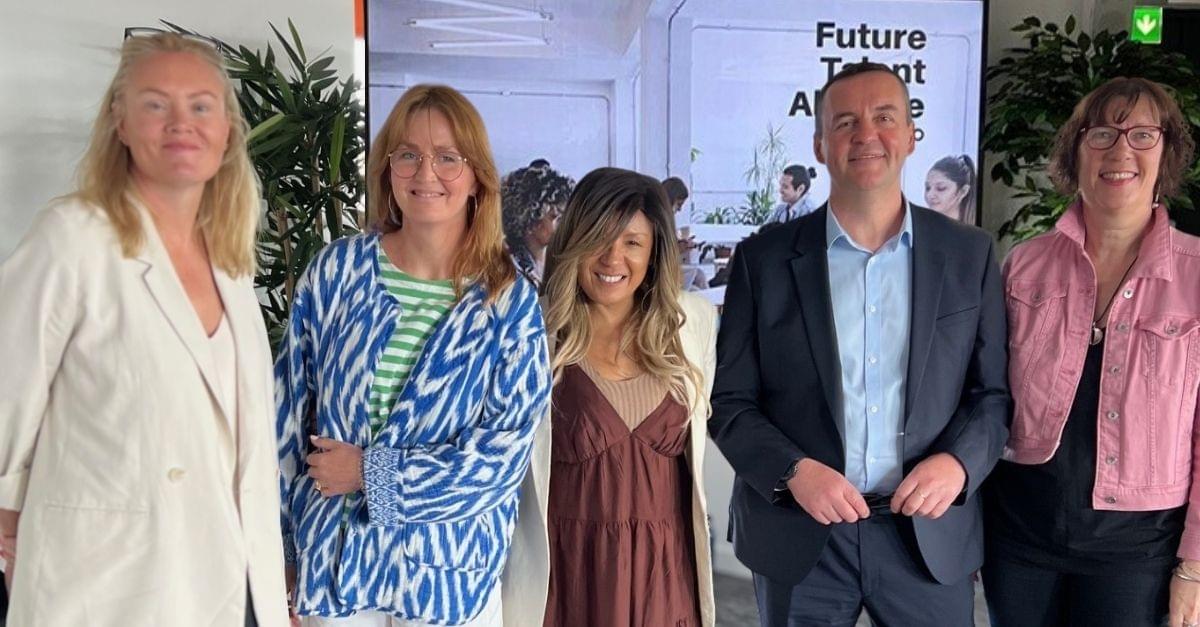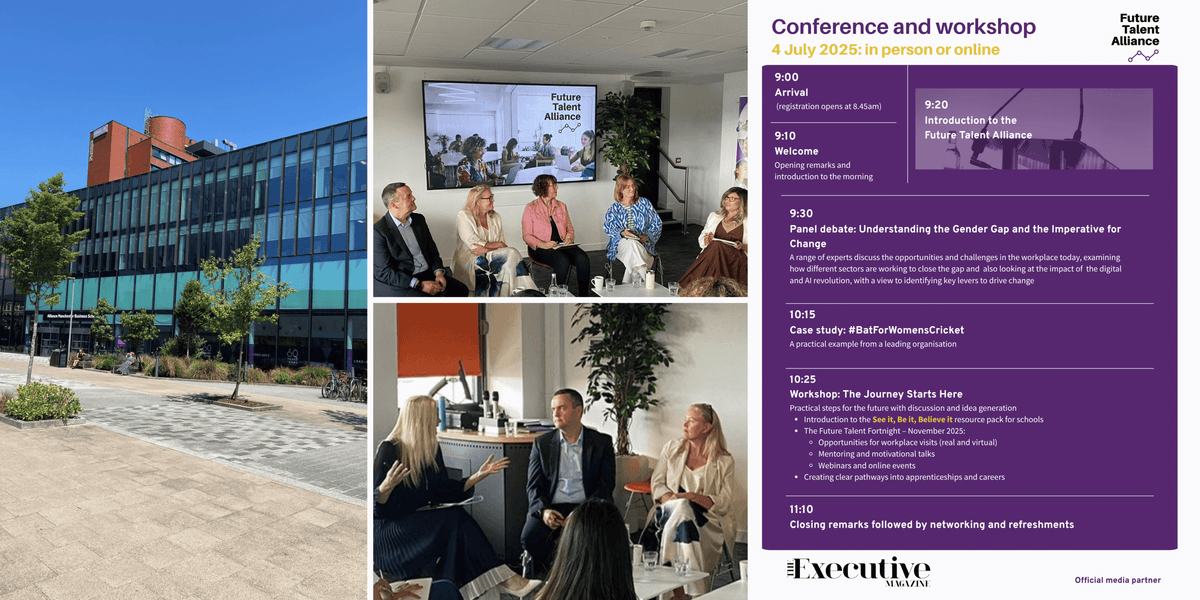The launch of the Future Talent Alliance brought together business leaders, educators, innovators and changemakers to help drive gender parity and inclusion by bridging the gap between businesses and schools to shape the UK’s future talent pipeline.
In the inaugural debate, hosted at Alliance Manchester Business School and joined virtually by guests across the UK, a powerhouse panel came together to discuss the scale of the problem and to identify key levers for driving change, with a view to creating the first set of resources for schools.
These will be aimed at schoolchildren aged 12 to 13 and will showcase role models across multiple sectors and introduce different work environments.
Statistics presented at the outset of the event painted a stark picture. In 2025, 78% of UK businesses pay men more than women, which is the same as in 2018. Women hold less than 25% of science, engineering and ICT jobs, and a gender gap is emerging in maths and science in UK schools, according to a study that has been examining this over a five-year period.
Sharing insights on inclusion, innovation and the power of representation to address this, the panel, which spanned multiple sectors, from tech and finance to education and healthcare included:
- Naomi Timperley FRSA, co-founder of Tech North Advocates and named by Computer Weekly as one of the most influential women in tech
- Katharina Koall, executive dean at University Academy 92 (UA92) and pioneer in designing inclusive curriculums
- Tim McFarlane, a senior leader at NatWest which has been running its own educational programme for over three decades
- Natalie Jameson, a tech leader, educator and innovator who has led transformative projects across fintech, healthtech and edtech
- Rebecca Ganz, a strategic adviser and Northern lead for Women on Boards

Special guest Nikki King CBE also joined the debate, together with one of the programme’s partners from the motor industry, Warrington Isuzu. Formerly the CEO of Isuzu Truck UK, she shared insights from her business life, as well as her work in education with The Skills for Life Trust.
The discussion ranged from inclusive curriculums to the power of mentoring, the importance of community engagement and how technology can help scale access to opportunity.
Here are six of the most important takeaways from the day:
1. A holistic approach
The panel debate started with an important note that pure inclusion is not about superficial representation, but cultural change. Katharina Koall, executive dean at UA92, spoke about the importance of embedding inclusion across every level of education and leadership, emphasising that young people need to see themselves reflected in positions of influence.
“As long as the faces of power don’t reflect the faces in our classrooms, we are failing the next generation,” said Katharina.
Similarly, Nikki King CBE shared her success in driving cultural shifts at Isuzu Truck UK by putting values and people first, leading to a 50% female management team during her tenure. Inclusion, the panel agreed, has to start from the top and reach every corner of an organisation’s culture.
2. Beyond the school gates
A recurring theme was the need to better support schools, teachers and parents in navigating today’s fast-changing careers landscape. Naomi Timperley highlighted that careers advisors are often under-resourced and may not have up-to-date knowledge of the vast opportunities available in sectors like tech.
Naomi said: “There are roles that haven't even been invented yet, so we all have a responsibility to support careers advisors and teachers in learning about the plethora of opportunities out there”
However, Naomi, who has spent countless hours in schools to support careers guidance and talk about tech, added that schools don't always have an obvious front door, and therefore access can be challenging.
Beyond teachers, the role of parents and carers was also underscored. Both Katharina and Nikki King CBE emphasised how influential parents are in shaping children’s aspirations for better or worse. Nikki recalled young girls within the five academies she worked with limiting their goals based on their mother's jobs.
Meanwhile Katharina suggested leadership programmes shouldn't be just for students, but for families also, to equip them with the language and understanding to continue the much needed conversations at home.
3. Role models, mentors and allies
The panel agreed: representation matters, but so does support. It’s not enough to have visible role models. We also need allies and mentors who walk alongside young people, especially those who may lack confidence or guidance.
Tim McFarlane, customer service and operations lead at NatWest said: “It’s about recognising that there's a problem, but also recognising you've got a part to play. Being a role model, whether male or female, applies beyond the workplace and provides the opportunity to really shape young minds. We’ve seen this within our own education programme aimed at boosting future skills for young people.”
Tim shared his learned experience from NatWest's own education programme and highlighted the importance of boys seeing strong females in powerful roles at an early age.
He also gave an example of pairing junior female staff with senior male mentors in a reciprocal mentoring programme as an example of how businesses can create spaces for continuous learning and advocacy. As a senior leader in finance, Tim’s own experience bucks the wider industry picture, with a team that is two thirds female, rising to 80% when it comes to leadership roles.
Nikki King CBE emphasised the need to appreciate the differences in thought processes all genders can bring to the table, in the boardroom as well as the classroom.
4. National approach, local outreach
Several panellists stressed the need for a national programme that is delivered locally. Successful initiatives shared on the day included not only The Skills for Life Trust but also Naomi’s tech sessions in Manchester schools and Rebecca’s work with the NHS in Bolton. All had one thing in common; they were rooted in local engagement and community.
Sharing learnings from the highly successful programme which saw her recognised for services to education, Nikki King CBE said: “We know this model works. For example, we worked with local companies that made it part of their training to mentor young people in schools which ultimately led to work experience and often job offers.”
Rebecca Ganz echoed this, talking about her experience with the NHS, as well as a multi-academy trust. Rebecca said: “What’s needed is the passion and the impetus to build what I call locality movements that can create overarching connections. This can be so powerful when working with schools and with businesses too.”
Similarly, NatWest’s Thrive programme (the UK’s longest-running financial education scheme), relies on local delivery partners and volunteers to reach students in a meaningful way.
5. Technology can help scale opportunity
For many, technology is the key to scalability, but only when designed inclusively. Natalie, a design thinker and edtech innovator, explained how tech can expand access to role models and learning, especially when embedded into the curriculum.
“Scalability is absolutely key. Technology can help intersperse culturally diverse role models into the curriculum and widen young people's world view,“ said Natalie. “I'm a design thinker, so I would go back to helping the kids to really understand themselves first.”
Natalie also spoke about how tech tools can help students explore their own strengths, constraints and interests to help support more personalised and informed career pathways. Whether that be through mentoring platforms, or 60 seconds of content on platforms like TikTok, the right channels can meet students where they are.
6. From EDI to culture: a shift in mindset
In the final part of the debate, panelists urged a move away from siloed thinking where EDI (equality, diversity and inclusion) is sometimes seen as a tick box and instead towards a culture-first mindset. Natalie advocated for creating universally accessible environments rather than focusing narrowly on diversity targets. Nelle Walsh, an EDI strategist in attendance, summarised this: “It’s really all about culture: collective cultural intelligence.”
Soft skills, personal experience and the cultivation of a productive mindset are gaining recognition as essential factors for growth. By broadening our definition of achievement to include these attributes, especially for younger generations, we can help foster a future workforce that is more diverse, innovative and interconnected.
Amp’s own Dee Gallagher who hosted the debate concluded: “By striving for gender parity and inclusion, brands will benefit in so many ways. It's going to support your talent pipeline. It's going to support your brand reputation. It's going to support your people and culture. It’s also going to support your bottom line, as our case study has shown. Ultimately, though, it’s a simple matter of being the right thing to do.”
